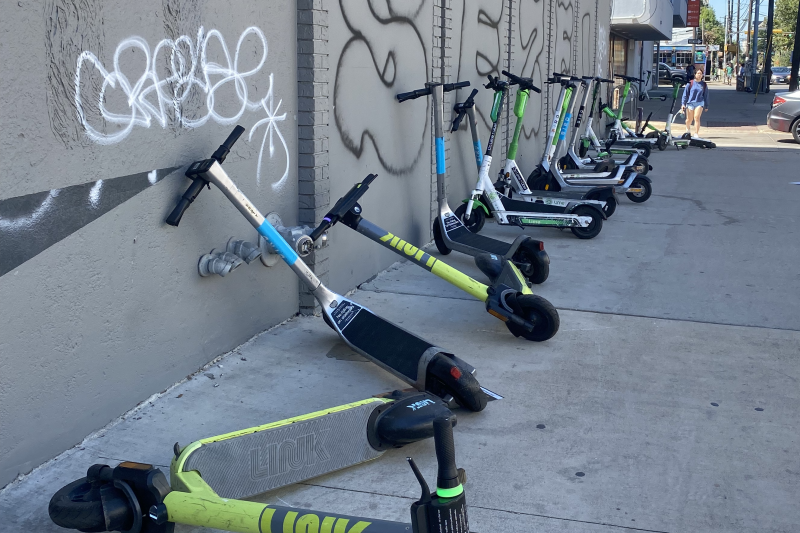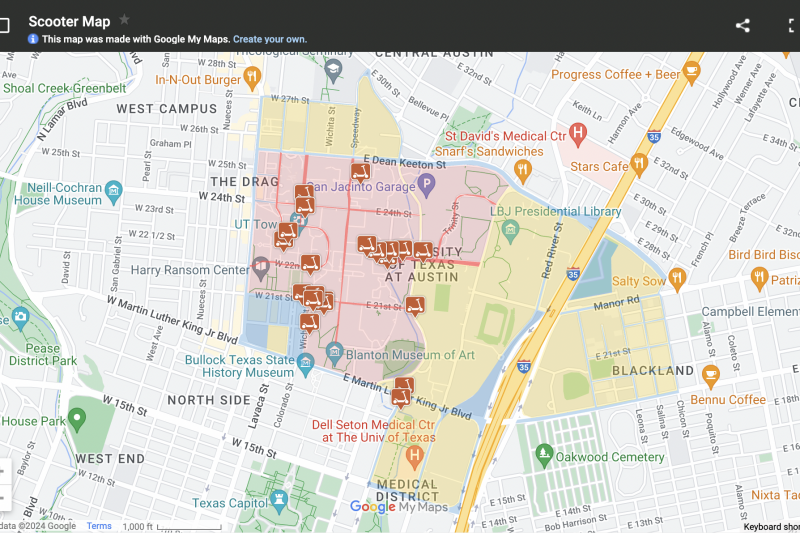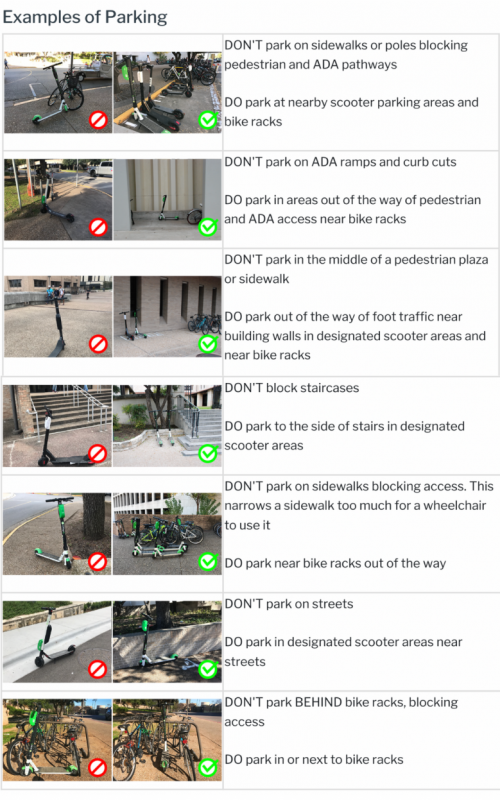E-Scooters Raise Accessibility Concerns for Disabled Students on UT Campus
By Evelyn Martinez
Reporting Texas TV
AUSTIN, Texas – The growing use of rentable electric scooters across the city can be seen by anyone who’s walked downtown in recent years, often roughly parked along sidewalks or splayed across pedestrian walkways. But what may be a nuisance for residents out for a daily stroll can be actively harmful for those living with a disability.
Wheelchair user and social work major Fabiola Amaya said she encounters scooters almost daily. Having lived in a dorm since her freshman year, the issue of accessibility within university grounds inspired her to found On the Moov, a resource that pairs disabled students with able-bodied volunteers to help better navigate their day-to-day lives on campus. This is how she has managed to avoid situations like missing class or moving through busy roads.
Although On the Moov has helped alleviate struggles for some, Amaya said it’s not enough.
“There’s still countless students who don’t have that support because of our limited resources,” Amaya said. “I have a friend who has had to go on the street instead of the sidewalk. It’s dangerous.”
Part-time mobility aid user and speech pathology major Mira Desai usually travels alone and has also had problems with e-scooters blocking her easiest routes to class.
“Even for some able-bodied people, [scooters] can pose an obstruction,” Desai said. “[Riders are] also using the sidewalks and it’s not safe for them to go on the road either. I just think it would be better for everyone if [scooters] were just put in a better place.”

Many scooters parked outside Shoe Palace on March 25 were on their sides. These are common sights along Guadalupe Street, across from the UT campus in Austin, Texas. (Evelyn Martinez/Reporting Texas TV)
Amaya also expressed concern about the university’s response when confronted with issues of accessibility on campus. When attempting to raise awareness about inaccessibility within campus dining halls, she described the process as “a big loop” in which multiple resources like UT’s Disability and Access (D&A) and Americans with Disabilities Act (ADA) coordinators passed the problem onto someone else instead of providing answers.
“You shouldn’t have to do that when you’re just trying to access the education that you’re paying for,” Amaya said.
Disability Cultural Center director Emily Shryock, who used to work for D&A, said the issue is multifaceted and requires various solutions from different departments. She said responsibility falls on users, companies and administrators, and believes the best avenue is overall education along with policy change.
“Making it more of a collective community response rather than just a policy response,” Shryock said. “I think both are important and both are necessary. We need that education, but then it would be helpful to have the regulations and policy to go along with that.”
The Disability Cultural Center opened in January 2023 to provide a more hands-on approach to campus-wide issues. Unlike D&A, which focuses on academic and housing accommodations, the Disability Cultural Center’s broader scope facilitates conversations around disability and advocacy, as well as providing a community for both faculty and students.
Shryock, who uses a wheelchair, said she noticed the problem e-scooters brought to disabled people when they arrived in Austin in 2018. Resources like D&A’s “Report a Barrier” and the President’s Accessibility Committee allow students to immediately report scooter parking violations and to advocate for change. However, neighborhoods including West and North Campus lie within the city’s jurisdiction, and the university is not required to address problems there.
“I think there’s definitely opportunities for partnership, but it would need to have interest in collaboration on both sides, because UT doesn’t have the authority to implement anything off campus without that involvement from the city,” Shryock said.
UT’s Parking and Transportation services directly manage the pay-to-ride scooters found throughout campus. In an email, director Blanca Gamez explained that the two campus-approved scooter companies, Lime and Byrd, “have crews on campus between 7 p.m. and 10 p.m. moving scooters to the correct parking locations to avoid blocking sidewalks and ramps.” She said any member of the university community can report a scooter parking violation to PTS via email at [email protected].
“When a report is received, PTS staff and scooter company crews will remove the incorrectly parked scooter or park it in an available space,” Gamez said.

UT’s Parking and Transportation Services website maintains a map for e-scooter riders of parking locations, speed limits and restrictive areas across campus.
Amaya said that although this resource is helpful, it is neither an immediate nor permanent solution. She, Desai, and Shryock agreed that community action is the best avenue for disabled students to decrease this problem.
“I think a lot of that comes from (students) having an ignorance to it, so they’re like ‘I can just step over it, so everybody else can,’ and that’s not at all what’s happening,” Amaya said.
“It’s [students] taking on that responsibility of making it more of a collaborative effort to make campus more accessible.”
Shryock encouraged students to make their voices heard by starting advocacy campaigns to raise awareness of the issue and to participate in the Accessibility Committee’s annual open forum on April 4. This forum will allow public comments, a form of direct communication that she said is extremely important in order to keep the conversation of accessibility in the minds of UT administration.
“This is an ongoing issue,” she said. “So the more voices and more people we have talking about it and learning about it is how we’re going to create change.”
UT’s Parking and Transportation Services website provides the following guide to the dos and don’ts of scooter parking, accompanied by visual images of violations.
